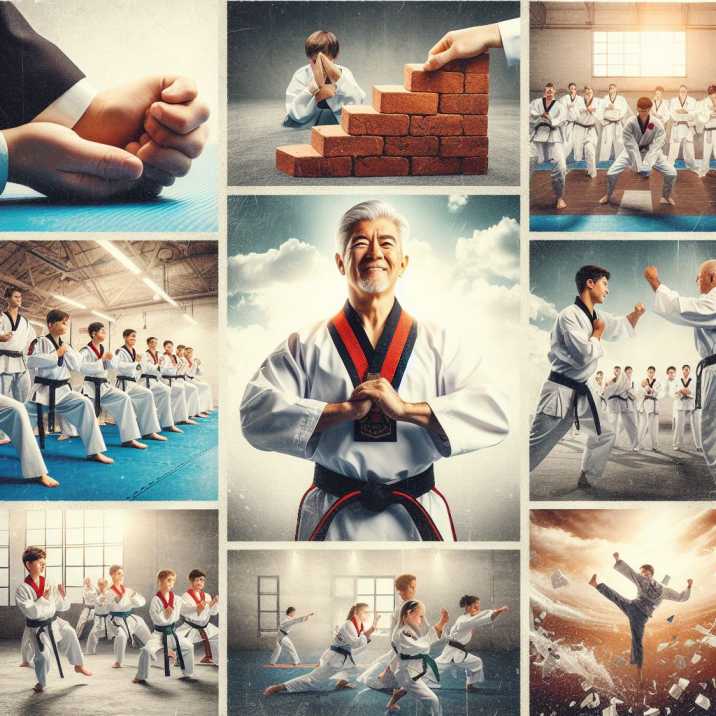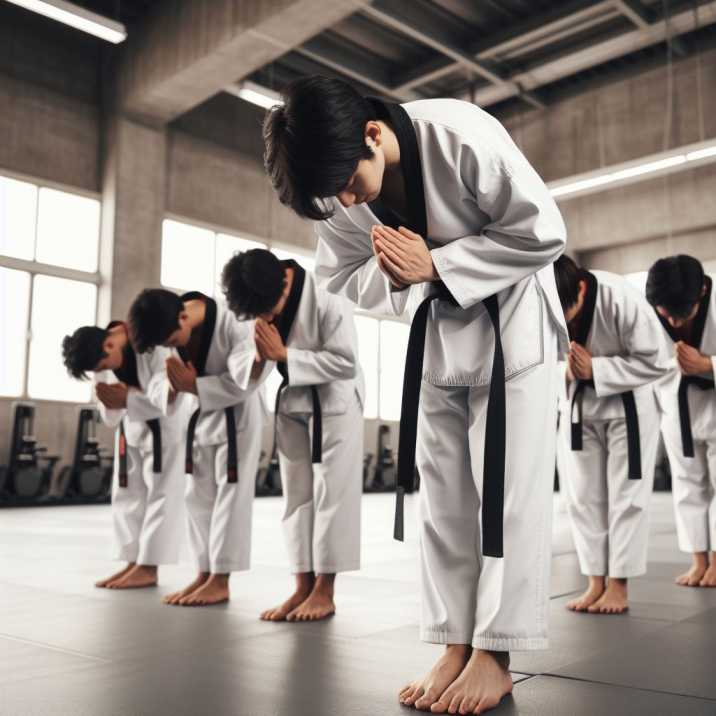Introduction:
Table of Contents
Tenets of Taekwondo
Taekwondo, a martial art form rooted in ancient Korean traditions, is not merely about physical combat. It embodies a philosophy that cultivates discipline, respect, and self-improvement. In this comprehensive guide, we delve into the core principles, known as the “Tenets of Taekwondo,” that serve as the foundation for practitioners worldwide.

Understanding the Essence: Courtesy
Courtesy, or Ye Ui in Korean, is the first tenets of taekwondo. It emphasizes the importance of respect and humility both inside and outside the dojang (training hall). Practitioners learn to bow as a sign of respect before and after engaging in any activity. This simple gesture symbolizes humility and sets the tone for a respectful training environment.
Tips for Practitioners:
- Always bow when entering or leaving the training area.
- Address instructors and senior practitioners with appropriate titles.
- Practice active listening and show respect for fellow practitioners.
Facts to Remember:
- Courtesy extends beyond the dojang and should be practiced in everyday life.
- In tournaments, competitors bow to each other before and after a match as a sign of respect.

Integrity: The Pillar of Character
Integrity, or Yom Chi, is the second tenet of Taekwondo, emphasizing honesty and moral character. Practitioners are encouraged to uphold high ethical standards both on and off the mat. Integrity forms the cornerstone of trust within the Taekwondo community.
Insights for Practitioners:
- Be truthful in all interactions, even when faced with challenges.
- Admit mistakes and take responsibility for your actions.
- Uphold the values of fairness and sportsmanship in competitions.
Key Facts:
- In Taekwondo, integrity is demonstrated through adherence to the rules and regulations of the art.
- Practitioners are expected to show integrity by respecting opponents and avoiding unsportsmanlike behavior.
Perseverance: Nurturing the Warrior Spirit
Perseverance, or In Nae, is the third tenet of Taekwondo, emphasizing the importance of resilience and determination. Practitioners learn to overcome obstacles and setbacks through persistent effort. This tenet instills the mindset of continuous improvement and growth.
Practical Tips:
- Set specific goals and work towards achieving them step by step.
- Embrace challenges as opportunities for growth rather than setbacks.
- Stay committed to your training regimen, even when faced with difficulties.
Interesting Facts:
- The belt system in Taekwondo reflects the journey of perseverance, with practitioners advancing through different ranks as they progress.
- Perseverance is often tested through rigorous training sessions and belt promotion tests.
Self-Control: Mastering Mind and Body
Self-Control, or Guk Gi, is the fourth tenet of Taekwondo, emphasizing discipline and restraint. Practitioners learn to harness their physical and emotional impulses, developing a sense of inner calm and focus. This tenet is essential for maintaining control in both combat and everyday situations.
Practical Insights:
- Practice deep breathing and mindfulness techniques to maintain composure during stressful situations.
- Channel emotions such as anger or frustration into productive energy.
- Avoid reacting impulsively and instead respond thoughtfully to challenges.
Key Facts:
- Self-control is demonstrated through precise and controlled movements in Taekwondo techniques.
- Practitioners are taught to exercise restraint in both verbal and physical confrontations.
Indomitable Spirit: Unwavering Determination
Indomitable Spirit, or Baekjul Boolgool, is the fifth tenet of Taekwondo, emphasizing courage and resilience in the face of adversity. Practitioners cultivate a mindset of fearlessness and determination, refusing to be defeated by obstacles.
Practical Tips:
- Embrace challenges as opportunities for personal growth and development.
- Develop mental toughness through visualization and positive affirmations.
- Stay motivated by focusing on long-term goals and aspirations.
Interesting Facts:
- The term “indomitable spirit” originates from the Korean War and reflects the resilience of the Korean people in the face of adversity.
- In Taekwondo competitions, practitioners often display indomitable spirit by pushing through fatigue and exhaustion to achieve victory.
Conclusion:
The tenets of Taekwondo embody a holistic philosophy that extends beyond physical techniques. By embracing courtesy, integrity, perseverance, self-control, and indomitable spirit, practitioners cultivate not only their martial skills but also their character and inner strength. These timeless principles serve as a guide for personal growth and development both on and off the mat. Whether you’re a seasoned practitioner or a beginner, incorporating these tenets into your practice will undoubtedly lead to a fulfilling journey of self-discovery and empowerment.
Frequently Asked Questions (FAQs)
1. What are the Five Tenets of Taekwondo?
The Five Tenets of Taekwondo are Courtesy, Integrity, Perseverance, Self-Control, and Indomitable Spirit. These principles serve as the foundation of Taekwondo philosophy, guiding practitioners in both their training and daily lives.
2. How do the Tenets of Taekwondo contribute to personal growth?
The Tenets of Taekwondo promote values such as respect, honesty, perseverance, discipline, and courage. By incorporating these principles into their practice, practitioners not only develop physical skills but also cultivate strong character traits that contribute to personal growth and development.
3. How can I apply the Tenets of Taekwondo outside of the training hall?
The principles of Taekwondo are not limited to the confines of the training hall; they can be applied to various aspects of life. For example, showing courtesy and respect towards others, maintaining integrity in all actions, persevering through challenges, exercising self-control in difficult situations, and embodying indomitable spirit in the face of adversity are all ways to apply the Tenets of Taekwondo in daily life.
4. What role do the Tenets of Taekwondo play in competitions?
In Taekwondo competitions, practitioners are expected to demonstrate not only their physical skills but also their adherence to the principles of Taekwondo. Competitors display courtesy by bowing to their opponents and referees, uphold integrity by following the rules and regulations, showcase perseverance by pushing through fatigue and challenges, exhibit self-control by maintaining composure during intense matches, and demonstrate indomitable spirit by refusing to give up, regardless of the outcome.
5. How can beginners incorporate the Tenets of Taekwondo into their practice?
Beginners can incorporate the Tenets of Taekwondo into their practice by consciously applying them during training sessions. This may involve showing respect to instructors and fellow practitioners, practicing honesty and fairness in their actions, persevering through difficult techniques or drills, exercising self-control in maintaining proper form and focus, and embracing challenges with a determined and resilient mindset. As beginners progress in their Taekwondo journey, these principles become ingrained in their practice and contribute to their overall growth as martial artists and individuals.


